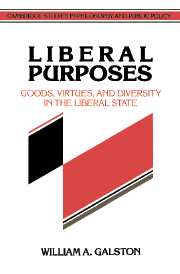10 - Liberal virtues
Published online by Cambridge University Press: 05 June 2012
Summary
For two generations, scholarly inquiry has been dominated by the belief that the liberal polity does not require individual virtue. On the theoretical plane, liberalism has been understood by many as the articles of a peace treaty among individuals with diverse conceptions of the good but common interests in self-preservation and prosperity. On the level of basic institutions, the liberal constitution has been regarded as an artful contrivance of countervailing powers and counterbalancing passions. In the arena of liberal society, individual behavior has been analyzed through the prism, and public policy guided by the precepts, of neoclassical economics.
The conclusion that liberalism could be severed, in theory and in practice, from the concern for virtue was shared by scholars of widely divergent orientations. Although Leo Strauss was on the whole sympathetic and C. B. Macpherson hostile to the liberal polity, they converged on an interpretation of Locke that stressed his effort to liberate individual acquisitiveness from traditional moral constraints. Martin Diamond and Gordon Wood could agree on the essentials of the interest-based “new science of politics” that displaced civic republicanism and undergirded the Constitution. The understanding of modern liberal society as an agglomeration of self-interested individuals and groups formed a common point of departure for defenders of pluralism (such as Robert Dahl in his 1950s incarnation) and its critics (led by Theodore Lowi).
Although the various analysts of liberalism were not in agreement on a specific conception of virtue, they united in the belief that liberal theory and practice stood in tension with virtue however conceived.
- Type
- Chapter
- Information
- Liberal PurposesGoods, Virtues, and Diversity in the Liberal State, pp. 213 - 238Publisher: Cambridge University PressPrint publication year: 1991
- 3
- Cited by



